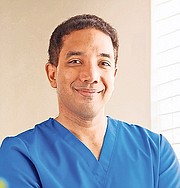By GREGGORY PINTO
Testosterone is the male sex hormone that is an important component of what makes men essentially men.
Testosterone is crucial in numerous aspects of male physiology, including genital development, hair growth, muscle growth and maintenance, bone density, sperm production, red blood cell production, sexual libido and erections; amongst many others.
Late onset hypogonadism, a fall in testosterone with the advancement of age, is strongly associated with male metabolic syndrome that can lead to multiple negative health effects, including insulin resistance, dyslipidemia, obesity, hypertension and increased risk for cardiovascular events.
The incidence of low testosterone is estimated between 2.1 and 22.4 percent for all men, depending on the threshold for defining low testosterone.
According to the American Urology Association, about two in 10 men over the age of 60 years old suffer from low testosterone. The prevalence increases to about three in 10 men over the age of 70. It is estimated that five to six million American men suffer from hypogonadism, with only about five percent of them seeking medical treatment.
Diabetic men and men who suffer from obesity have higher incidences of low testosterone.
The rate of testosterone production falls on average by one percent per year, starting at the age of 40. As they enter their 50s and 60s, men may experience reduced sexual interest with poor-quality erections, less intense orgasms, reduced penile sensitivity, mood disturbances, sleep disruption, reduced sperm production and ejaculate volume, possible anaemia, increase in fat distribution, with a loss in muscle mass.
All men with erectile dysfunction should have their total and free testosterone levels checked by having a simple blood test, along with a prostate specific antigen (PSA) blood test.
Low testosterone still remains a condition unknown to a majority of Bahamian men.
The Endocrine Society recognises low testosterone as being a value less than 300 ng/dl. Treatment with testosterone supplementation is recommended for those men with clinical symptoms of low testosterone and verified low testosterone blood levels.
Testosterone supplementation is contraindicated in men with active prostate cancer as testosterone is required for existing prostate cancer to proliferate.
There is no increased risk for prostate cancer with testosterone supplementation, and prostate cancer patients who have been in remission for two years can safely receive testosterone treatment according to multiple well-established long-term studies.
Men with breast cancer, severe heart failure and untreated obstructive sleep apnea have a relative contraindication for testosterone supplementation.
Available testosterone exogenous preparations including injections, topical gels, pellets and testosterone patches. Testosterone in pill form has a high risk of associated liver toxicity and is not approved by the FDA.
Testosterone supplementation for symptomatic men with low testosterone can improve erectile function, sexual stamina and interest and improve the quality of previously diminished orgasms.
For men interested in fathering a child, testosterone supplementation could potentially reduce male fertility rates.
Bahamian men, if you have experienced poor erections, reduced sexual interest, less intense orgasms, then low testosterone may be the root cause. Erectile dysfunction may be caused by multiple factors, but low testosterone should be ruled out.
It is common for men with borderline low testosterone to have positive results with PDE5 inhibitor medications Cialis, Levitra or Viagra. but as their testosterone levels continue to fall, these medications become less and less effective and often stop being beneficial for erectile function altogether.
Seek confidential, compassionate and comprehensive urological care and have your testosterone blood levels checked, along with your PSA blood levels.
Treated symptomatic low testosterone can potentially give you back your good-quality erections, sexual vigour, aid in weight loss and improve your vitality amongst multiple other positive health benefits.
•Dr Greggory Pinto is a Bahamian urologist who has trained in South Africa, France and Germany under the world-renowned prostate minimally invasive pioneer, Professor Andreas Gross in Hamburg. He has a wealth of experience with all forms of minimally invasive endoscopic prostate procedures including bipolar transurethral resection of prostates and Thulium and Holium laser prostate vaporisation and enucleation, and the UroLift procedure. Dr Pinto can be reached at Urology Care Bahamas at the Surgical Suite, Centreville Medical Centre, Collins Avenue and Sixth Terrace. Call 326-1929, e-mail welcome@urologycarebahamas.com, or visit urologycarebahamas.com.





Comments
Use the comment form below to begin a discussion about this content.
Sign in to comment
OpenID